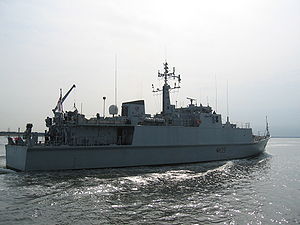HMS Bangor (M109)
 HMS Bangor sweeping Southampton Water in preparation for the International Fleet Review 2005.
| |
| History | |
|---|---|
| Name | Bangor |
| Namesake | Bangor, County Down |
| Operator | Royal Navy |
| Builder | Vosper Thornycroft |
| Launched | 16 April 1999 |
| Commissioned | 26 July 2000 |
| Homeport | HMNB Clyde |
| Identification | |
| Status | in active service |
| General characteristics | |
| Class and type | Sandown-class minehunter |
| Displacement | 600 t (590 long tons; 660 short tons)[1] |
| Length | 52.5 m (172 ft 3 in) |
| Beam | 10.9 m (35 ft 9 in) |
| Draught | 2.3 m (7 ft 7 in) |
| Propulsion | Paxman Valenta 6RP200E diesels 1,523 shp (1,136 kW), diesel-electric drive, Voith Schneider Propellers, Schottel bow thrusters |
| Speed | 13 knots (24 km/h; 15 mph) |
| Complement | 34 (accommodation for up to 40) |
| Sensors and processing systems |
|
| Electronic warfare & decoys |
|
| Armament |
|
HMS Bangor is a Sandown-class minehunter commissioned by the Royal Navy in 2000. Designed to hunt naval mines in depths of up to 200 m (660 ft) using the Sonar 2093 Variable Depth Sonar (VDS) meaning that she can conduct mine clearance operations throughout the continental shelf. She is named after the Northern Ireland seaside city of the same name, and the second Royal Navy vessel to bear the name. As of January 2024, she was the last vessel of her class in active Royal Navy service.
History
[edit]Through October 2011 Bangor conducted maritime security patrols off Misrata during the NATO military intervention in Libya.[3]
Bangor participated in the 2013 Exercise Joint Warrior.[4] She was stationed on the River Clyde for the 2014 Commonwealth Games in Glasgow. For the duration of the games the general public were allowed on board for a free tour.[5]
In mid-2021, Bangor deployed with HMS Middleton to join the vessels of 9 Mine Countermeasures Squadron operating out of HMS Jufair in Bahrain. Both vessels were upgraded with the Oceanographic Reconnaissance Combat Architecture (ORCA) system which assists vessels with a higher level of mine detection at greater stand-off distances. Bangor and Middleton were to relieve their sister vessels HMS Brocklesby and HMS Shoreham, which returned to the UK.[6]
In January 2024, her fibreglass hull, designed to minimise risk from magnetic mines, was damaged in a collision with HMS Chiddingfold in Bahrain whilst the latter was attempting to moor.[7] There had been speculation that the ship might not be repaired given her planned decommissioning by 2025.[8] However, as of August 2024, she was dry-docked for repair having suffered some further damage in a subsequent collision with USS Gladiator.[9][10]
References
[edit]- ^ "Sandown Class Mine Countermeasures Vessels - Specifications". GlobalSecurity.org. 11 July 2011. Retrieved 8 June 2014.
- ^ "In focus: the Fleet Solid Support ship design". Navy Lookout. 28 February 2023. Retrieved 14 April 2023.
- ^ "UK operations over Libya continue". Ministry of Defence. 14 October 2011. Archived from the original on 26 October 2012. Retrieved 17 March 2019.
- ^ "Scotland set to host Exercise Joint Warrior". Royal Navy. 2 October 2013. Archived from the original on 9 October 2013. Retrieved 17 March 2019.
- ^ Ferguson, Brian (16 May 2014). "Royal Navy to stage Glasgow 2014 show on Clyde". The Scotsman. Retrieved 17 March 2019.
- ^ "UK minehunter joins operations in region". ZAWYA. 28 July 2021.
- ^ Allison, George (19 January 2024). "British minehunters collide in Gulf, damage to be assessed". UK Defence Journal.
- ^ "A naval accident in context – Royal Navy minehunters collide in Bahrain". Navy Lookout. 22 January 2024.
- ^ @NavyLookout (21 August 2024). "@NavyLookout . @HMSBangor is now dry docked in Bahrain for damage assessment and is likley to be repaired following allision with HMS Chiddingfold in January" (Tweet). Retrieved 22 August 2024 – via Twitter.
- ^ "HMS Bangor being repaired in Bahrain following damage sustained earlier this year". Navy Lookout. 9 November 2024.
External links
[edit]"HMS Bangor". Royal Navy.
